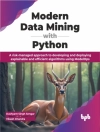Knowledge Discovery demonstrates intelligent computing at its best, and is the most desirable and interesting end-product of Information Technology. To be able to discover and to extract knowledge from data is a task that many researchers and practitioners are endeavoring to accomplish. There is a lot of hidden knowledge waiting to be discovered – this is the challenge created by today’s abundance of data.
Data Mining and Knowledge Discovery Handbook, Second Edition organizes the most current concepts, theories, standards, methodologies, trends, challenges and applications of data mining (DM) and knowledge discovery in databases (KDD) into a coherent and unified repository. This handbook first surveys, then provides comprehensive yet concise algorithmic descriptions of methods, including classic methods plus the extensions and novel methods developed recently. This volume concludes with in-depth descriptions of data mining applications in various interdisciplinary industries including finance, marketing, medicine, biology, engineering, telecommunications, software, and security.
Data Mining and Knowledge Discovery Handbook, Second Edition is designed for research scientists, libraries and advanced-level students in computer science and engineering as a reference. This handbook is also suitable for professionals in industry, for computing applications, information systems management, and strategic research management.
İçerik tablosu
to Knowledge Discovery and Data Mining.- Preprocessing Methods.- Data Cleansing: A Prelude to Knowledge Discovery.- Handling Missing Attribute Values.- Geometric Methods for Feature Extraction and Dimensional Reduction – A Guided Tour.- Dimension Reduction and Feature Selection.- Discretization Methods.- Outlier Detection.- Supervised Methods.- Supervised Learning.- Classification Trees.- Bayesian Networks.- Data Mining within a Regression Framework.- Support Vector Machines.- Rule Induction.- Unsupervised Methods.- A survey of Clustering Algorithms.- Association Rules.- Frequent Set Mining.- Constraint-based Data Mining.- Link Analysis.- Soft Computing Methods.- A Review of Evolutionary Algorithms for Data Mining.- A Review of Reinforcement Learning Methods.- Neural Networks For Data Mining.- Granular Computing and Rough Sets – An Incremental Development.- Pattern Clustering Using a Swarm Intelligence Approach.- Using Fuzzy Logic in Data Mining.- Supporting Methods.- Statistical Methods for Data Mining.- Logics for Data Mining.- Wavelet Methods in Data Mining.- Fractal Mining – Self Similarity-based Clustering and its Applications.- Visual Analysis of Sequences Using Fractal Geometry.- Interestingness Measures – On Determining What Is Interesting.- Quality Assessment Approaches in Data Mining.- Data Mining Model Comparison.- Data Mining Query Languages.- Advanced Methods.- Mining Multi-label Data.- Privacy in Data Mining.- Meta-Learning – Concepts and Techniques.- Bias vs Variance Decomposition for Regression and Classification.- Mining with Rare Cases.- Data Stream Mining.- Mining Concept-Drifting Data Streams.- Mining High-Dimensional Data.- Text Mining and Information Extraction.- Spatial Data Mining.- Spatio-temporal clustering.- Data Mining for Imbalanced Datasets: An Overview.- Relational Data Mining.- Web Mining.- A Review of Web Document Clustering Approaches.- Causal Discovery.- Ensemble Methods in Supervised Learning.- Data Mining using Decomposition Methods.- Information Fusion – Methods and Aggregation Operators.- Parallel and Grid-Based Data Mining – Algorithms, Models and Systems for High-Performance KDD.- Collaborative Data Mining.- Organizational Data Mining.- Mining Time Series Data.- Applications.- Multimedia Data Mining.- Data Mining in Medicine.- Learning Information Patterns in Biological Databases – Stochastic Data Mining.- Data Mining for Financial Applications.- Data Mining for Intrusion Detection.- Data Mining for CRM.- Data Mining for Target Marketing.- NHECD – Nano Health and Environmental Commented Database.- Software.- Commercial Data Mining Software.- Weka-A Machine Learning Workbench for Data Mining.
Yazar hakkında
Prof. Oded Maimon is the Oracle chaired Professor at Tel-Aviv University, Previously at MIT. Oded is a leader expert in the field of data mining and knowledge discovery. He published many articles on new algorithms and seven significant award winning books in the field since 2000. He has also developed and implemented successful applications in the Industry. He heads an international research group sponsored by European Union awards.
Dr. Lior Rokach is a senior lecturer at the Department of Information System Engineering at Ben-Gurion University. He is a recognized expert in intelligent information systems and has held several leading positions in this field. His main areas of interest are Data Mining, Pattern Recognition, and Recommender Systems. Dr. Rokach is the author of over 70 refereed papers in leading journals, conference proceedings and book chapters. In addition he has authored six books and edited three others books.












